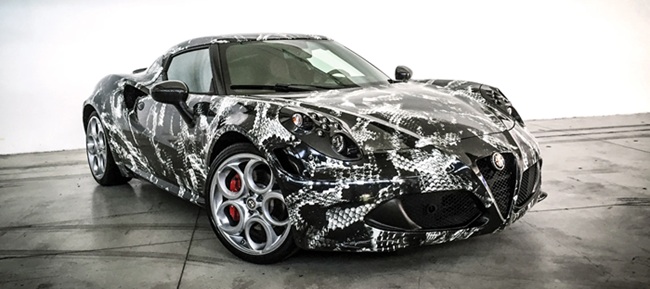When people think of sports cars. Its usually all about iconic badges like Jaguar, Porsche, Chevrolet, Lexus, Cadillac, and Pontiac. No one really thinks custom sports cars straight away.
The iconic manufacturers represent the height of speed, luxury, and style. But here’s a little secret: not all the cars you see turning heads on the street are factory-made.
Some are custom-built replicas. Which are crafted with precision to look and perform like the originals, but tailored to the exact preferences of the driver.
For many enthusiasts, the thrill of owning a sports car isn’t just about the badge on the hood—it’s about the journey of designing and building a car from scratch (or nearly so).
Whether through kit cars, replica industries, or fully bespoke builds, you can create a machine that’s both high-performance and deeply personal.
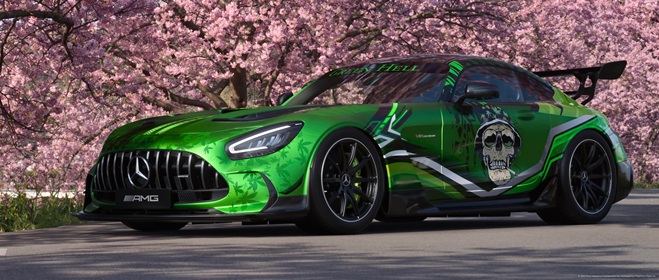
Custom Sports Car – The Guide to Building Your Own
This guide will walk you through everything you need to know about custom sports cars. From the first decisions on body style, to choosing frames and engines, managing costs, navigating legal hurdles, and ultimately enjoying the drive of your life.
Roadster or Coupe? Choosing the Foundation
The very first decision in a custom build is usually about style and driving experience.
Roadster
An open-top, two-seat car designed for sheer driving pleasure. Perfect if you want to feel the wind and hear every note of the engine. Roadsters are often lighter and more agile, but less practical in poor weather.
Coupe
A closed-roof sports car that emphasizes aerodynamics, comfort, and sleek looks. Coupes are ideal for drivers who want a balance between everyday usability and sporty aesthetics.
Replica and kit car companies can adapt their designs to either preference, so think carefully about what kind of driving thrills you most.
The Big Kit – Where It All Begins
Before you can start building, you’ll need a kit. Kits are sold by specialized companies and include most of the key components needed to assemble a car. The level of completeness varies:
Basic kits
Often include just the body shell and frame. The builder sources the engine, transmission, suspension, and interior separately.
Comprehensive kits
Provide nearly everything—frame, body, suspension components, wiring, interior pieces, and sometimes even engine/transmission options.
Key Kit Elements
There are some key elements you need when starting to build you own custom sports car.
The Frame
There are a couple of choice you have when it comes to the frame.
Round Tube Frame
Lighter, tougher, and excellent for performance builds. Offers rigidity without excess weight.
Square Tube Frame
Easier to design and fabricate, but may force trade-offs between strength and style.
The Body
Look for dimensionally accurate fiberglass shells with reinforced foot boxes for comfort.
A well-designed body should feel like part of the chassis, not just a shell bolted on top.
Suspension Options
Some kit manufacturers create their own suspension systems.
Others recommend proven setups, like those from the Mustang GT, which balance performance and availability of parts.
Avoid overly complex systems, such as the Jaguar independent rear suspension, which can be harder to maintain.
Wiring & Interior Basics
Kits often include wiring harnesses, dashboards, and seats. Higher-end kits may even provide gauges, carpets, and trim pieces.
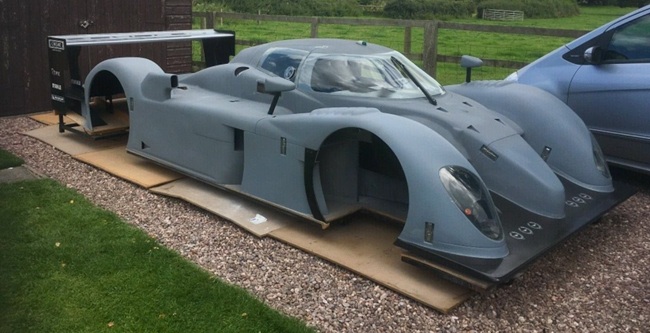
Choosing an Engine – The Heart of the Beast
The engine defines the character of your car. Popular choices for custom builds include:
Ford 302 V8 (400-hp)
A classic and affordable option that pairs beautifully with a T-5 five-speed manual transmission. Reliable, powerful, and widely supported.
Chevrolet LS Series Engines
Known for modern performance, efficiency, and massive aftermarket support.
Big Block Engines
Deliver raw power and torque but may require structural reinforcement and sacrifice some drivability.
Your choice should balance budget, desired performance, and ease of maintenance. Remember that higher horsepower often means higher costs for cooling, suspension, and drivetrain components to keep up.
Accessories and Comfort Features
A great sports car is more than just an engine on wheels. The finishing touches matter for performance, comfort, and reliability:
Cooling systems
Radiators, overflow tanks, and fans are crucial to prevent overheating.
Fuel delivery
Fuel injection systems offer better reliability than carburetors for most builds.
Wiper and lighting systems
Often required by law for road registration.
Oil filter relocators
Make engine servicing much easier.
Air conditioning
Optional, but a lifesaver if you plan to drive in hot climates.
Think carefully about which features you want. As each option adds complexity and cost, but can also make your car more usable day to day.
Paint and Finishing
A custom sports car isn’t complete without a stunning finish. This is where you can truly express your personality:
Single-color paint jobs
Clean, classic, and often less expensive.
Metallic or pearlescent finishes
Add depth and shimmer under sunlight.
Racing stripes or custom graphics
Perfect for capturing that track-inspired look.
Ceramic coating or clear film
Protects your investment from scratches and UV damage.
Professional paint jobs can range from $3,000 to $15,000+ depending on complexity and quality.
Now Its The Build Process
Every builder’s journey is different, but here’s a typical outline of what you can expect.
- Frame Assembly – Install the chassis and suspension.
- Engine & Transmission Mounting – Fit the heart of the car into place.
- Body Installation – Align and secure the fiberglass shell to the frame.
- Wiring & Plumbing – Route electrical systems, fuel lines, and cooling systems.
- Interior Fitting – Install seats, dashboard, pedals, and gauges.
- Paint & Exterior Finishing – Apply the chosen color and polish.
- Final Tuning – Adjust suspension, test brakes, align wheels, and tune the engine.
DIY builders usually take anywhere from 6 months to 2 years to complete a project, depending on skill level and free time.
Professional shops can finish in 6–12 months, though bespoke details may take longer.
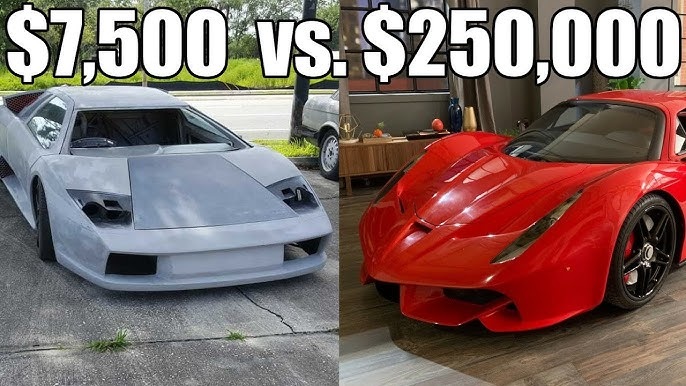
Cost Breakdown – What to Expect
Custom sports cars are not cheap. Here’s a rough guide:
- Basic kit: $15,000–$25,000
- Engine and transmission: $8,000–$20,000
- Suspension and brakes: $5,000–$12,000
- Paint and bodywork: $3,000–$15,000
- Interior and accessories: $3,000–$10,000
- Professional labor (if not DIY): $20,000–$50,000
Total estimated costs can range from $30,000 for a DIY budget build to $100,000+ for a fully turnkey replica.
Legal and Safety Considerations
Custom cars need to be legal as well as beautiful. Requirements vary by region, but common considerations include:
- Registration: Some areas classify replicas as “kit cars,” with unique titling rules.
- Emissions compliance: Especially strict in states like California.
- Safety equipment: Seatbelts, mirrors, lights, and sometimes airbags are mandatory.
- Insurance: Standard policies may not cover custom builds—look for specialty insurers who understand replica values.
Always check with your local DMV or vehicle authority before you start your build to avoid headaches later.
Maintenance & Long-Term Ownership
Owning a custom-built car is different from owning a factory-made vehicle. Be prepared for:
- More frequent maintenance: Parts may wear faster, especially in high-performance builds.
- Specialized knowledge: You’ll need to understand your car’s unique setup, or find a mechanic who does.
- Parts sourcing: Replacement parts may not always be available off-the-shelf.
The upside? You’ll develop a deep connection with your machine and join a community of enthusiasts who share tips, tricks, and support.
A Reflection of Personality
A custom sports cars aren’t just about horsepower or looks. It’s an extension of the driver’s identity.
Whether you dream of a track-ready beast, a vintage-inspired roadster, or a weekend cruiser with modern comforts, customization gives you the freedom to create something truly one of a kind.
The most important step is choosing a reputable kit manufacturer or replica builder who supports you throughout the process.
With the right guidance, your dream car isn’t just possible. It’s waiting for you to bring it to life.
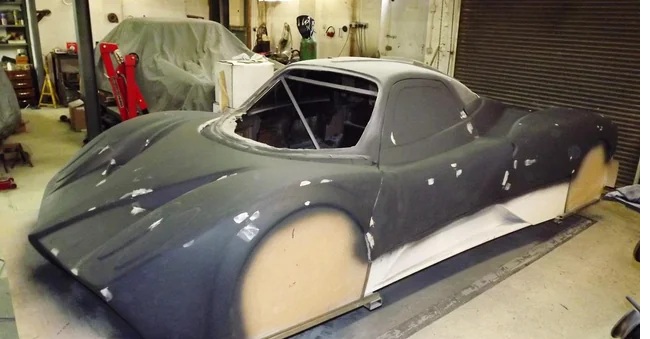
Frequently Asked Questions (FAQ)
Q1. Are custom-built cars street legal?
Yes, but it depends on local regulations. You’ll usually need functioning lights, seatbelts, mirrors, and wipers. Some areas require emissions compliance too.
Q2. Do I need mechanical experience to build a kit car?
Not necessarily. Many builders are hobbyists who learn along the way. However, complex builds may require professional help with wiring, tuning, or suspension setup.
Q3. How much does insurance cost for a custom-built sports car?
Specialty insurance is typically required. Costs vary based on the car’s value and intended use but expect to pay $800–$2,000 annually for agreed-value coverage.
Q4. How long will it take to build?
DIY builds: 6–24 months depending on time and skill. Professional turnkey builds: 6–12 months.
Q5. Can I use modern features in a replica
(like ABS or infotainment systems)?
Yes—many builders integrate modern safety and tech into classic-style replicas for the best of both worlds.
Quick Tips for First-Time Builders
Here are some of the quick tops you might find helpful to start with.
- Start with a reputable kit company – Research reviews, warranties, and support options.
- Plan your budget realistically – Costs almost always run higher than expected.
- Don’t cut corners on safety – Invest in quality brakes, suspension, and seatbelts.
- Join enthusiast forums – Online communities are gold mines for advice and troubleshooting.
- Be patient – Building a car takes time. Rushing leads to mistakes.
Our Final Thoughts
A custom-built sports car is more than a vehicle. It’s a passion project, an engineering challenge, and a rolling piece of art that reflects its owner.
From selecting the perfect engine to applying the final coat of paint, every decision is yours to make. And when you finally turn the key and hear that engine roar, you’ll know the journey was worth every hour and every dollar.
There is nothing better then family of friends sitting in your custom sports cars running down to the beach. The will love it.

